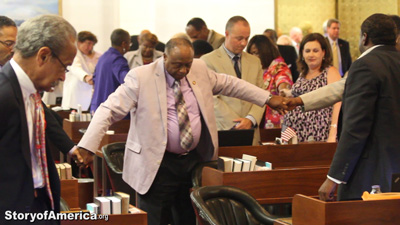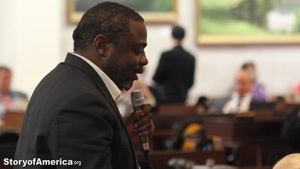11:32 pm July 25: The North Carolina House voted to accept the changes made by the Senate to HB 589, originally a Voter ID bill. The vote was on party line, with every Republican voting for it and every Democrat voting against it.

During more than two hours of debate, only one Republican stood up to defend the bill as amended by the Senate. Rep. David Lewis (R-Harnett) had been credited by many, including us, for holding three extensive hearings to get public and expert input on the voter ID bill. I was curious to see how he would respond to the host of voting restrictions added to his bill by Senate Republicans (see below). He defended them vigorously, but I couldn’t help but wonder, “If Rep. Lewis had wanted all these measures that make it harder to vote, why hadn’t he put them in the bill in the first place?”
Those Democrats who had voted the bill out of the House earlier in the session — I counted three, but it could have been two (it’s been a long day) — said that they appreciated the care that was taken in the House version to enact a Voter ID law without, in their opinion, unduly disenfranchising poor, elderly, disabled, and minority voters. But, they each said they could not vote to concur with the Senate version due to the changes that were made to the Voter ID provisions, and, due to the other restrictions that were added.
As the vote was being recorded, several of the Democrats held hands in a circle in deference to the civil rights struggle to expand the right to vote, most of them having expressed their belief that a tragic setback was taking place before their eyes, one they were helpless to prevent. During the debate, African American, Native American, and female representatives recalled civil rights struggles, including struggles in their own lives and in their parents’ lives. Toward the end of the debate, Rep. Becky Carney (D-Mecklenburg) begged her Republican colleagues to consider the emotion being expressed by some of the older Democratic representatives who had fought in the civil rights movement such as Rep. Henry M. Michaux, Jr (D-Durham). In general, Democrats seemed to be asking their more conservative colleagues to consider the judgement of history.
Unlike in the Senate chamber, which was combative and included many interruptions (“Would Sen. ___ yield for a question?” “Not at this time.”), Democrats spoke to their colleagues in a way that was familial, even gentle and caring at times. And, for two hours, the Republicans were silent, replying only with their eyes. Many listened intently, while others stared down at their phones and computers. Whereas in the Senate, I filmed several Republicans rolling their eyes when the rights of minorities were mentioned, in the House, I felt as if the sorrow to my left was shared among (at least) some of the members on my right.
Listening to the Democrats’ pleas, it was almost as if two school children, secretly friends during after-school hours, were being challenged by a bully on the playground who was victimizing one thanks to the silent consent of the other. “Why won’t you stand up for me,” they seemed to be saying, “my secret friend?” House Democrats implored their Republican colleagues to reject the Senate’s 44 pages of additional regulations, stand by version they had crafted in the House, and send it back to the Senate for more consideration.
 “Why would you let their principles overcome your principles, and what you know is right and what you know is wrong?” Rep. Marcus Brandon (D-Guilford) said.
“Why would you let their principles overcome your principles, and what you know is right and what you know is wrong?” Rep. Marcus Brandon (D-Guilford) said.
The House will be in session until midnight, and then reconvene at 9 am for other, less controversial business. We filmed some interviews on the House floor and the Senate floor during recesses, and are hanging around to see if we can grab one or two more when the House adjourns. [We did get two more interviews after the session ended not long after midnight. In all, we interviewed 3 Republicans (including Senate Majority Leader Berger and Rep. Lewis) and 3 Democrats (including Rep. Michaux).]
8:02 pm July 25: HB 589 is now being debated on the North Carolina House floor. The House unanimously voted to accept the two, bipartisan amendments that came back from the Senate. Prior to that, a party-line vote defeated a motion by Democrats to delay debate in order to study the nearly 44 additional pages that were added by the Senate to what had been a Voter ID bill, only.
House Speaker Thom Tillis (R-Mecklenburg) announced that debate would be limited to 2 hours. 90 minutes allotted to the minority, and 30 minutes allotted to the majority. Because HB 589 was already passed out of the House, this is a concurrence vote — a vote to agree to the 44 pages added to the bill by the Senate (see below).
Meanwhile, Planned Parenthood is marching from the General Assembly building to the office of Gov. McCrory (R) in order to demand that he veto the Motorcycle Safety (abortion restriction) bill that passed the Senate about an hour ago.
5:42 pm July 25: The bill has passed, and is now being sent to the NC House.
As we enter the third hour of debate, Senate Minority leader, Martin Nesbitt, Jr (D-Buncombe) is speaking now, which signals that debate is coming to an end.
4:04 pm July 25: Senate Debate on HB 589 is entering its second hour in its second day. Currently, two of the most extreme measures are not in the bill — the tax penalty on North Carolina parents whose children vote while in college, rather than returning home, and, the ban on Sunday voting. Yesterday, the bill was amended to make it more moderate (see below). Today, Sen. Dan Blue (D-Wake) seems to be moving the Senate body toward another amendment, this one to address a component of the bill that opened up the electoral process to anonymous corporate and private estate money. For instance, the bill as currently written does away with disclosure laws on campaign ads, and narrows the window during which the source of money for outside expenditures for political campaigns must be reported. Early in today’s debate, Sen. Blue made a strong argument against opening the door for the influence of money on the political process while restricting the ability of voters to have influence. Sen. Bob Rucho (R) granted that this was a problem, and a bipartisan amendment is in the works.
Since then, similar to yesterday, debate has broken down into a partisan divide based on whether or not the bevy of restrictions in the bill will disproportionately impact minorities, the poor, students, the elderly, and the disabled.
8:51 pm July 24: After a sweeping voting restrictions bill passed the NC state Senate, about 12 members of the Forward Together coalition (Moral Monday) left the Senate gallery and occupied the office of House Speaker Thom Tillis. They said they would not leave until they got a meeting with the Speaker, and, he agreed to block the advancement of the bill. The General Assembly police arrived and arrested 6 of the activists, including Bree Newsome, NAACP field director Rob Stephens and former field director Joshua Vincent.
The extreme makeover of the bill by Senate Republicans added changes to voter registration, early voting and campaign financing, among others, and prompted a sit-in in Speaker Thom Tillis’ office by protesters demanding that the proposals be scrapped.
6:44 pm July 24: The North Carolina Senate has returned from its second recess, almost back-to-back, since taking up what is being called the most severe voting restriction bill in America. Senators are hammering out what should turn out to be a bipartisan amendment to the bill, authored by Sen. Josh Stein (D-Wake).
The amendment is intended to “mitigate the damage” of reducing early voting days from 18 to 10 (I believe that is what the bill says) by stipulating that more early voting polling places will be opened, such that the number of hours is equal to the preceding presidential election, in presidential election years, and the preceding off-year election in off-year election years. The leading proponents of the bill, Sen. Bob Rucho (R-Mecklenburg) and Sen. Bob Apodaca (R-Henderson), received the suggestion favorably, and after two recesses, Sen. Stein re-introduced the amendment. The amendment passed 48-1.
Subsequent amendments coming from Democratic Senators have either been defeated on a party-line vote, or, in one case “laid upon the table,” a procedural vote that tables an amendment without affording it a vote. Sen. Apodaca has allowed debate on amendments to continue for many minutes in all cases, except in the case of an amendment by Sen. Malcolm Graham (D-Mecklenburg). His amendment would have undone the entire bill, pretty much, so it was “laid upon the table,” but not before a reasonably long debate.
In this video, filmed on July 23, Sen. Josh Stein (D-Wake) questions Sen. Bob Rucho (R-Mecklenburg), who was defending the bill. This could be a preview of what will take place on the Senate floor, probably this afternoon at 1 pm, when the bill comes up for a vote.
Concerned citizens filled the room and several were invited to give public comment by Rules Committee Chair Sen. Bob Apodaca (R-Henderson). When Joshua Vincent stepped to the podium, he asked those who opposed the bill to stand, the overwhelming majority of the citizens in attendance did so. I did notice that Barbara Holt, president of the anti-abbortion organization North Carolina Right to Life filing into the room before the hearing. I imagine she supports the bill, but I have not asked her.
The bill passed on a party line voice vote. It will now move to the full Senate for a series of votes, and will need concurrence from the House to become law.
In this column by Bob Geary of IndyWeek, he turns to Bob Hall, Executive Director of the non-partisan watchdog organization Democracy North Carolina for commentary on the new voting restrictions.
Here are some controversial features included in the rewritten bill, in addition to the Senate changes in the photo ID provisions (e.g., eliminating all college IDs, local government IDs):
** cuts a full week off the Early Voting period
** eliminates flexibility in opening Early Voting sites at different hours within a county
** eliminates same-day voter registration during Early Voting
** eliminates straight party ticket voting
** repeals pre-registration for 16 and 17 year olds and repeals mandate for election officials to conduct high-school registration drives
** authorizes vigilante poll observers, lots of them, with expanded range of interference
** expands the scope of who may examine registration records and challenge voters
** repeals out-of-precinct voting during early voting
Although Democratic Senators complained that they had not had sufficient time to review the bill before it hit the Senate Rules Committee, Republicans pointed out that there had been hearings on the House side earlier in the year. We were there.
On March 13, 2013, five experts in the field of voter ID legislation spoke in a hearing before North Carolina lawmakers, less than 24 hours after 70 people spoke out against upcoming legislation intended to require voters to show photo identification before voting (14 people spoke in favor of the law). Here is testimony from Mr. Hall:
Here are some other videos we’ve posted that have to do with voting laws:
Please support Story of America with a tax deductible donation.
